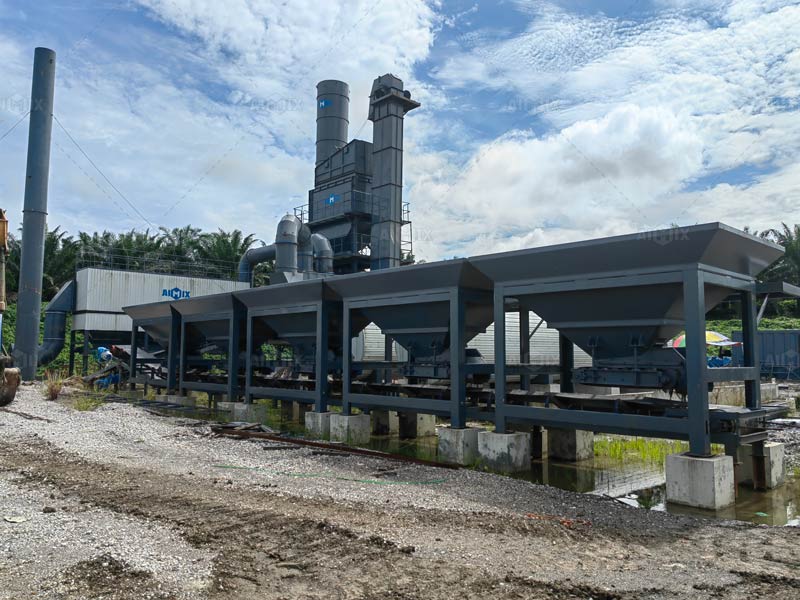Selecting Suitable Asphalt Plants According to the Demand and Quality of Asphalt Mixture
The demands of a project—whether it's a large-scale highway construction or a smaller bridge repair—directly influence the type of asphalt plant required. Furthermore, factors such as the specific quality of the asphalt mixture needed, the project's location, and the overall production capacity will play significant roles in determining the right equipment. In this article, we will discuss the key considerations for selecting the most suitable asphalt plant based on asphalt mixture demand and quality, and the role of asphalt plant price in this decision-making process.
Determining the Type of Asphalt Plant Needed
The first step in selecting the right asphalt plant is determining the production needs of the project. There are two main types of asphalt plants(planta de asfalto): batch mix asphalt plants and drum mix asphalt plants. Each type has its specific advantages and is suited to different project requirements.
Batch Mix Asphalt Plant
A batch mix asphalt plant is ideal for projects that require high-quality asphalt mixtures with precise control over production. This type of plant works in batches, allowing for the production of different asphalt grades and mix designs with consistent quality. It is typically used for larger projects where flexibility in mix specifications and higher quality are needed, such as highway construction, large-scale bridge projects, or areas where weather conditions demand special asphalt formulations.
Drum Mix Asphalt Plant
On the other hand, a drum mix asphalt plant is designed for continuous production, making it more suitable for high-volume, long-duration projects. This type of plant is efficient and cost-effective, especially when large quantities of asphalt mixture are needed without the requirement for variety in mix specifications. It is often used in projects that focus on speed and cost-effectiveness, such as large road resurfacing jobs or other similar applications.

Matching Asphalt Plant to Asphalt Mixture Quality
The quality of the asphalt mixture required for a project is another crucial factor in selecting the appropriate asphalt plant. Some projects demand high-performance asphalt mixtures with superior durability, while others may only need standard-grade mixtures.
High-Performance Asphalt Mixtures
For projects requiring high-performance asphalt mixtures, such as those subjected to heavy traffic or extreme weather conditions, a batch mix asphalt plant is typically more suitable. These plants offer the flexibility to create customized asphalt formulas with precise temperature control, adding additives and modifying the mixture to meet the specific performance requirements. The ability to monitor and adjust the production process ensures that the final product adheres to the highest standards of quality.
Standard-Grade Asphalt Mixtures
For projects with less stringent quality requirements, such as general road resurfacing or low-traffic areas, a drum mix asphalt plant may be sufficient. These plants are designed for quick, continuous mixing, producing a consistent asphalt mixture that meets general construction needs. While the quality is adequate for many standard applications, the mixture may not be as customized as those produced in a batch mix plant.
Considering Asphalt Plant Price in the Decision-Making Process
While the type and quality of asphalt mixture are primary considerations, asphalt plant price(planta de asfalto precio) is also a significant factor in selecting the right equipment for the project. The initial cost of the plant, along with its operational costs (such as fuel consumption, maintenance, and labor), must be considered in the context of the project's budget and timeline.
Evaluating the Long-Term Cost Effectiveness
While batch mix asphalt plants may have a higher initial price compared to drum mix asphalt plants, they offer greater flexibility and superior quality control, which can be crucial for high-end projects. Therefore, it’s important to evaluate the long-term cost-effectiveness. For example, projects that require more diverse asphalt mixtures may benefit from investing in a batch mix asphalt plant, as it could save on raw material costs by reducing waste and ensuring higher consistency.
On the other hand, for large-scale projects where uniformity and efficiency are key, and the demand for high-quality mixtures is lower, a drum mix asphalt plant might offer a more cost-effective solution due to its lower initial price and faster production rates.
Maintenance and Operational Costs
In addition to the initial asphalt plant price, it's essential to consider the maintenance and operational costs of the plant. Batch mix asphalt plants typically require more maintenance due to their complex operations, while drum mix asphalt plants are generally easier to maintain and operate. This can influence the total cost of ownership, especially for long-term projects.
Conclusion
Selecting the right asphalt plant for a road or bridge construction project depends on a variety of factors, including the project's scale, the required quality of the asphalt mixture, and the budget available. For projects requiring high-quality, customizable asphalt mixtures, a batch mix asphalt plant is often the best choice, while drum mix asphalt plants are more suited for large, high-volume projects where efficiency is the top priority.
Moreover, while asphalt plant price plays a critical role in decision-making, it should be weighed alongside long-term operational costs and the specific needs of the project. By considering the type of plant, the required quality of asphalt mixture, and the associated costs, construction companies can make a well-informed decision that ensures the success of their projects and maximizes overall efficiency.
Subscribe to unlock premium content
Sed at tellus, pharetra lacus, aenean risus non nisl ultricies commodo diam aliquet arcu enim eu leo porttitor habitasse adipiscing porttitor varius ultricies facilisis viverra lacus neque.



